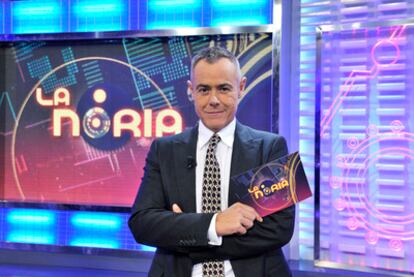Popular late-night show "La Noria" could come to a grinding halt
Advertisers pull out after controversial interview with murder suspect's mother
It has been the most popular late-night talk show for the past four years. Filled with controversy, fun and informative interviews and debates - and of course, lots of money to be given away to viewers who call in - La Noria has long been a Saturday-night staple for millions of viewers across Spain.
Its host, Jordi González, presents a weekly panel of well-known journalists, politicians, showbiz celebrities, and even members of the Spanish jet set, to discuss the issues of the week plus talk and gossip about their own lives, loves and losses, and those of others.
With his commanding presence and ability to calm a rowdy audience or panel, the Catalonia-born González has become one of the most popular television personalities in recent years. But now he is quickly becoming TV land's scorned host, and all because of one interview, which led to an avalanche of protests and boycotts. The fuss could well bring La Noria (meaning the Ferris wheel) to a complete stop.
On October 29, González interviewed Rosalía García, the mother of one of the three young men indicted for the January 2009 murder of Marta del Castillo, a 17-year-old Seville girl whose body has never been found. García's son Francisco Javier García, known as "El Cuco," was a juvenile at the time and was charged with covering up the crime and helping dispose of her body. But, like his co-defendants, he has not been up front with investigators.
Before the mother's appearance on La Noria, Facebook and Twitter campaigns began demanding that viewers boycott the Telecinco show's sponsors if the interview was broadcast. Their biggest gripe: Rosalía García was to receive 10,000 euros for telling her version of events.
The call for the boycott worked: La Noria has now lost all its sponsors. It began with a group of heavyweights, including Campofrío, Puleva, Bayer and Nestlé, which pulled their ads from the show the following Saturday after García's appearance.
"There will be no change in the time slot," says a spokesman for Mediaset, the broadcast company that owns Telecinco, denying that La Noria will be canceled.
González, who this past week won the prestigious Protagonistas award for best presenter, remains confident. "Advertising will return because time always puts things in perspective." He has been critical of the sponsors' pullout, saying that the decision infringed on freedom of speech.
This isn't the first time La Noria and its host have found themselves in a tight spot. In September 2007, a week after the show's debut, González angered the LGBT community by holding a discussion with doctors who claimed they have successfully "cured" homosexuals.
Madrid Socialist councilor Pedro Zerolo, a leader in the gay community, immediately sent a letter to La Noria's producers complaining about the content of the program. "It is dangerous and unthinkable to say that homosexuality can be cured. The World Health Organization stopped treating homosexuality as a disorder 20 years ago. While I respect freedom of expression, I think that it was improper for a network like Telecinco to broadcast such a program."
A seasoned broadcaster, González knows all about freedom of expression. He got his start on the radio in Reus, and one year later joined SER where he hosted the program Radio abajo del sol (Radio under the Sun) on Radio Barcelona, which won a coveted Onda award in 1986.
Two years later, he made his jump to television with a program on Catalan TV. But most of González's career has been forged at Telecinco. He got his start by replacing Javier Sardà on the debate show Moros y Cristianos.
Since then he has jumped from gig to gig at Antena 3 and Telemadrid before coming back to Telecinco in 2003 with Corazón abierto (Open heart), which shared the dark sides of celebrities with viewers.
His fame grew with Gran Hermano (the Spanish version of Big Brother) and its subsequent sequels.
In late August 2007, La Noria debuted as the latest in a collective of magazine programs that litter the Spanish airwaves. It replaced Sábado dolce vita, a program about socialites. "It is not going to be a program just about showbiz," said Adrián Madrid, one of the show's creators.
Since its first broadcast, the show has invited countless controversial guests, including some scandalous characters such as Jorge Garrido, the deputy secretary general of the ultra-right-wing Spanish Falange de las JONS party, and Francisco Franco's grandson, Jaime Martínez de Bordiú, who has been convicted of gender violence offenses.

Tu suscripción se está usando en otro dispositivo
¿Quieres añadir otro usuario a tu suscripción?
Si continúas leyendo en este dispositivo, no se podrá leer en el otro.
FlechaTu suscripción se está usando en otro dispositivo y solo puedes acceder a EL PAÍS desde un dispositivo a la vez.
Si quieres compartir tu cuenta, cambia tu suscripción a la modalidad Premium, así podrás añadir otro usuario. Cada uno accederá con su propia cuenta de email, lo que os permitirá personalizar vuestra experiencia en EL PAÍS.
¿Tienes una suscripción de empresa? Accede aquí para contratar más cuentas.
En el caso de no saber quién está usando tu cuenta, te recomendamos cambiar tu contraseña aquí.
Si decides continuar compartiendo tu cuenta, este mensaje se mostrará en tu dispositivo y en el de la otra persona que está usando tu cuenta de forma indefinida, afectando a tu experiencia de lectura. Puedes consultar aquí los términos y condiciones de la suscripción digital.








































